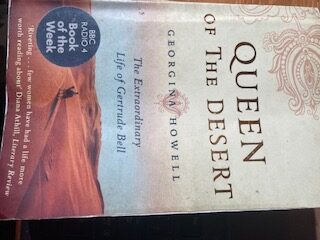16 December 2021
‘Queen of the Desert’
Gertrude Bell.
By Lynda Goetz

Given that the name of this magazine, as stated in the About Us section, is a tribute to T.E. Lawrence, the author of The Seven Pillars of Wisdom, it is perhaps appropriate that we should again find time to address the role in Middle Eastern events played by an older contemporary of Lawrence, one Gertrude Bell*.
Whilst most have heard of Lawrence of Arabia, as T.E. Lawrence is more widely known, it seems that relatively few have heard of Miss Bell. A film starring Nicole Kidman made in 2015 should have made the name more familiar to a wider audience, but the life of this remarkable woman remains to a large degree overshadowed by the more renowned Lawrence. Unfortunately the film, directed by Werner Herzog, was poorly reviewed, generally regarded as dull and did little either to bring Miss Bell’s remarkable experiences to life, or to highlight the role she played in shaping the Middle East after the First World War and the fall of the Ottoman Empire.
Queen of the Desert, by Georgina Howell (2015), originally published as Daughter of the Desert in 2007 is an excellent, well-researched biography of an extraordinary woman who, defying all the conventions of her time, forged her own path to become a key player in the re-shaping of the Arab world. Reading it, one is left in little doubt that this lady was a key historic figure and a person of real character. Her advice to the Arab Bureau and to Churchill, based on her numerous expeditions into the desert, was fundamental to the way the Arab countries were ruled after the war. With the benefit of hindsight, it is clear that Bell’s sympathies and close connections lay more with the Sunnis than the Shiites and the fact that the Iraq she helped create was weighted in favour of the Sunnis would become a source of future dissension as the Kurds and the Shiites sought to gain power of their own. (The British, of course, did not want to have to deal with three separate oil-producing states, so one state with one ruler suited them far better.)
Gertrude Margaret Lowthian Bell was born in 1868. Her grandfather was Sir Isaac Lowthian Bell, a wealthy and innovative industrialist and Liberal Member of Parliament. Her father, Sir Hugh Bell, 2nd Baronet, was a great influence in Gertrude’s life, as was her stepmother, Hugh’s second wife Florence (her mother died giving birth to her brother Maurice). Florence was a very different character from Gertrude, but was able to help Hugh to bring up and guide a step-daughter who was not only very intelligent, but very headstrong. Gertrude went up to Lady Margaret Hall, Oxford to read history and became one of the first women to graduate with a first class honours degree. The family moved in powerful and society circles and it would have been easy for Gertrude to ‘come out’, find a husband and lead the sort of conventional life expected of girls of her class. That was never to be.
Although it is clear from her own writings, extensively reported and used in Ms Howell’s books, that Gertrude would have liked an ‘intimate’ relationship and did fall in love twice, domestic contentment evaded her. Her love of archaeology was fired initially by a visit in 1892 to her uncle, Sir Frank Lascelles, who was British ambassador in Tehran. She picked up languages easily and learnt first Persian and then Arabic. For a number of years she also undertook several climbing expeditions in the Alps and became known as one of the leading climbers of her day. There is even a peak, Gertrudespitze, named after her.
Using family money, Gertrude began to mount increasingly daring expeditions in the Middle East, then still ruled by the Ottoman Empire but comprised of many warring tribes with little or no allegiance to the Ottomans. She made these expeditions essentially alone, taking with her local guides and trains of camels and travelling with Bedouin tribes when and where she could. Her main purpose was to record and photograph the many archaeological sites. The Foreign Office opposed her lone adventures and most were unsanctioned by officialdom.
Although she had turned her back on society life in England she still enjoyed some creature comforts and travelled with a portable bath and two tents, one of which she used for writing and dining. Given that she needed to be able to meet with sheikhs, unused to dealing in any way with women as equals, it was important that she present herself as an important personage. She used to dress for dinner (latest fashions sent from home by Florence) and give impressive gifts whenever she was invited to a sheikh’s tent. Her constantly improving fluency in Persian and Arabic gave her the sort of access that was not available to those with lesser knowledge of the languages. Amongst her many writings was a translation of the poems of Hafiz, one of the most celebrated Persian poets, acclaimed throughout the Islamic world.
This life of self-education and learning, as she improved her linguistic abilities, archaeological interests and photographic talents, might have continued had it not been for the outbreak of war. She volunteered and was sent to assist the Red Cross in Northern France as they tried, amidst the chaos, to locate ‘missing persons’. She rapidly put her formidable intellectual and organisational abilities to use and began setting up a proper data base so that the haphazard methods of recording, cataloguing and then communicating with families became a thing of the past.
By 1915 she got her wish to go to the Middle East and was sent to the newly established Arab Bureau in Cairo, set up to gather and analyse information to help the British oust the Turks. It was here that her many talents were really put to use in the war effort. She re-met T E Lawrence, whom she had first met in 1909. She was twenty years older than Lawrence, but both were Oxford history graduates, both archaeologists and fluent Arabic speakers who saw that the interests of the Arabs tribesmen could be allied with the British. Her report, Self-Determination in Mesopotamia, earned her a mention in Parliament and a place ultimately at the 1919 Peace Conference in Paris and subsequently at the 1921 conference in Cairo with then colonial secretary Winston Churchill. She was the only woman working for the British Government in the Middle East and the knowledge she had gained during her expeditions and the contacts she had established were crucial.
Unfortunately for both Bell and Lawrence, the British Government had over-promised and the French were (some would say as usual) being difficult. The two dominant clans in the region were the Hashemites and the Al-Sauds (what we now call the Saudis). The Hashemites, led at the time by Hussein Ibn Ali, were descended from the clan of the Prophet Muhammad whereas the al-Sauds had ruled Arabia by right of conquest off and on for some two hundred years. The al-Sauds had gained the support of the Wahhabists, an intolerant purist branch of Islam (an influence which has lasted to the present day), and both clans were looking to extend their control. Bell and hence the British supported Hussein and he was promised a more extensive Arab state (very roughly everything between Egypt and Persia), but then the British turned around and agreed to give Syria and Lebanon to France. They also agreed in theory to the establishment of a Jewish state in Palestine, a proposition to which Gertrude Bell was opposed. France had no interest in a self-governing Syria or Lebanon.
The final carving-up of Mesopotamia and the surrounding areas was inevitably a compromise. Much of the unrest in that part of the world today can be directly traced back to the post First World War divisions, but the area was, both before and during the Ottoman Empire, always febrile, unsettled and tribal. Gertrude Bell was an influential woman, but her influence and knowledge could only do so much. What actually happened was out of her hands and British and French government wishes had a part to play that she was unable to control.
Georgina Howell’s biography with the many extracts of Gertrude Bell’s own writings makes for a really interesting read. Her subject is three dimensional, characterful and relatable. Yet it is hard to feel she was ever sympathetic to other women or indeed that she had much time for them. She was actively against the Suffrage movement. Many of the wives of the men she knew or worked with were dismissed in her correspondence with words such as ‘charming little wife’ or other similarly patronising terms. It is very easy to admire this trailblazer of a woman, but hard to feel she would have made an easy companion or a good friend.
*See also The Queen and the Khatoun by Jehad Al-Omari (Shaw Sheet, issue 244, 03/07/2020).


